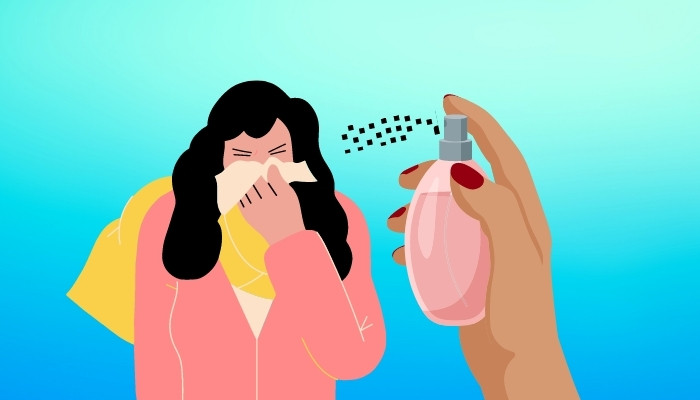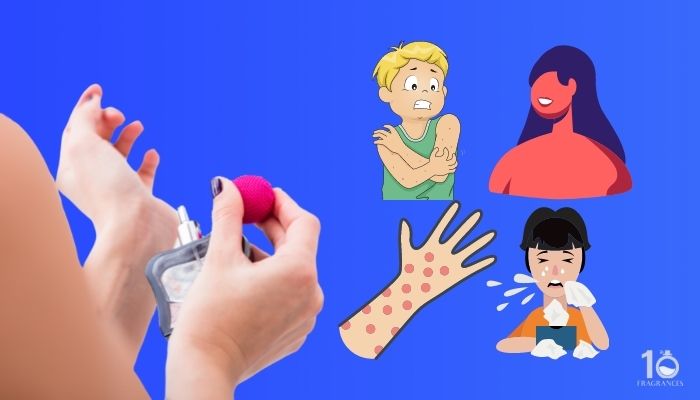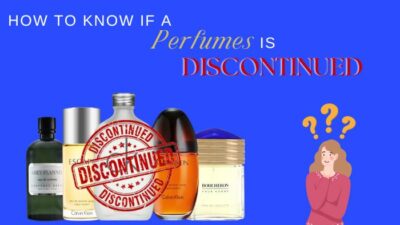I know how difficult it is to give up perfumes even when scents become a nightmare for us.
Fragrances are so personal it just doesn’t only make us smell great but also make us feel confident.
I know how big of an issue perfume allergies are, so keep reading as I am here to help you out.

What To Wear If You’re Allergic To Perfume?
Sensitive skin is prone to perfume allergies, but you can always use other scented products as an alternative. Moreover, there are ways to avoid direct contact with perfume as well as counter allergy medications to help with allergies, but you need to see a doctor for that.
Follow our guide to know What Are The Alternative Usages Of Perfume?
Can Perfumes Cause Allergies?
Yes, perfumes can cause allergies because they can have ingredients like citronella, oakmoss, balsam of Peru, and other synthetic components. These ingredients are common to cause skin problems and trigger asthma. However, you can wear perfume and be safe even if you are allergic.
We love to smell good, especially when we are going out; fragrances boost our confidence and overall presence.
However, as much as we would all love to enjoy scents, many of us are allergic to them.
Perfumes can indeed cause severe allergic reactions for some and make it impossible to wear fragrances.
However, perfume manufacturers are helpless because they need help from specific ingredients to make a fragrance.
To keep the integrity of a perfume like it’s longevity and scent, often synthetic components are used that are not friendly to the skin, especially for sensitive ones.
Otherwise, your fragrance would lose its smell sooner, and we wouldn’t be able to use them for years.
And your health and wellness should always come first, so that’s always my top priority.
But that doesn’t mean that you need to give up entirely on perfumes.
There are ways to enjoy the aromatic experience of scents without getting allergic reactions.
Well, thankfully, you don’t have to say goodbye to your favorite scent yet.
So, wouldn’t it be great to wear perfume and without worrying about allergies?
How Do You Treat An Allergy To Perfume?
So the best treatment for perfume allergy is avoidance; however, it is impossible to avoid all fragrances.
Moreover, there is no cure for perfume allergies, but some people grow out of such sensitivities.
Also, there are counter allergy medications that can treat headaches and allergic reactions.
Since there is no cure for perfume allergies o manage this allergy, you should always carry allergy medication with you.
But you should seek advice from an allergist to determine which treatment works for you.
However, there are other ways to avoid perfume allergies and still enjoy the beautiful scents.
Here’s What To Do If You’re Allergic To Perfume:

1# Spray perfume on your clothes
You can always try spraying perfume in your clothes rather than directly into your skin. It can minimize the effects and let you enjoy your fragrance.
However, there are certain things you need to keep in mind:
Your allergy shouldn’t be smell-related.
If you sneeze every time you get a sniff of perfumes, then it doesn’t matter where you spray it.
Your perfume can stain your clothes.
Some perfumes have ingredients like alcohol, oil, and sometimes dye that can leave a stain on your fabric. So, you can try testing a bit beforehand to see if your fragrance leaves an oily-looking stain or not.
2# Apply perfume in a non-irritant part of your body
It is also possible that you can be allergic to only certain areas of your body. So, if you do find out the sensitive areas, you can avoid them and apply them elsewhere.
3# Use body powder
If you are severely allergic to perfumes, then you can switch to body powders. It is a good alternative as it doesn’t contain harsh chemicals and absorbs sweat to keep you dry all day.
Moreover, body powder scents are more long-lasting as it doesn’t evaporate.
4# Try less concentrated fragrances
You can always check if your fragrance is EDP or EDT and opt for a less strong fragrance.
5# Avoid alcohol-based fragrances
Often alcohol in perfume can lead to allergies, so you can try alternatives like wax-based perfumes or oil-based perfumes.
6# Try hair fragrances
Hair perfumes are a great way to make your fragrance last longer, plus it is safer to use scent on the hair rather than skin if you are allergic.
7# Use perfume oils
It is an excellent alternative to perfumes to get the same aromatic experience. And perfume oils have no chemicals plus alcohol, so that’s out, but because of that, it also doesn’t last long.
Also, Read our experience about Does Perfume Smell Different On Everyone?
Can You Develop An Allergy To Perfume?
Yes, we can develop an allergy to perfume if exposed to a fragrance that contains an allergen. You can get a perfume allergy from touching the scent liquid or substance, getting sprayed by it, or even inhaling some of it. Also, you can have perfume sensitivity, not allergies.
If you are one of those who have a ton of allergies, then you should keep your distance from high concentrated perfumes.
There are many ingredients used in a perfume now; any of those can be irritating for you.
Also, if you do develop allergies from fragrances, then you’d show symptoms.
The symptoms are a reflection of our immune system’s defense against germs.
However, it is also possible that the scent can irritate you directly at the airways leading to sneezes.
What Does Perfume Allergy Look Like?

Perfumes can trigger allergic symptoms that may be mild or serious that you’d need medical attention.
However, perfume allergy is a fragrance sensitivity or an allergy to some chemical in the scent.
You can have two types of allergy symptoms because of fragrance sensitivity which are like seasonal allergy symptoms. Also, you can have skin allergy symptoms.
Nonetheless, the symptoms you experience are directly related to whether you have a perfume allergy or sensitivity.
Most allergic reactions will give you an itchy red rash after being exposed to fragrances. Here are some of those symptoms:
- Itching
- Blisters
- Hives
- Scaly or dry skin
- Patchy or reddish skin
- Being more sensitive to sunlight than usual
- A burning sensation on your skin without any visible marks
Perfume sensitivity has its own set of symptoms. They are:
- Sneezing
- Itching, running, or stuffiness in your nose
- Postnasal drip
- Constant coughing
- Headaches
- Nausea
There are few severe allergic directions though that’s quite rare to happen because of scents. But you’d need immediate medical attention for such symptoms. Those symptoms are:
- Swelling in your mouth
- Swelling in your lips
- Swelling in your tongue
- Anaphylaxis
Extreme reactions will make it very difficult for you to breathe, and that is why you’d need immediate medical treatment.
When to Exactly See a Doctor?
You must see a doctor if you face any of the following symptoms:
- Large boils or hives that are painful or extremely itchy
- Feeling exhausted or drowsy
- Feeling confused, disoriented, or dizzy
- Feeling nauseous
- Heart rate spiking for no reason or beating abnormally
- You have a Fever (100.4°F or higher)
- You have symptoms of an infection on your skin or elsewhere, including if your skin is warm or an itchy rash that’s producing a thick, cloudy, discolored discharge.
- Your itchiness or rashes become painfully itchy or constantly distract you from your everyday life.
- Your rash is spreading out from the place it started to other parts of your body, or new rashes appear where you haven’t been exposed.
- You have a rash on your face or your genitals.
- Your symptoms don’t get any better or start to get worse after a few days or weeks.
- You have trouble breathing because of tightness in your throat.
Can You Suddenly Become Allergic To Perfume?
Yes, there have been many cases where many people suddenly get allergic to perfume. Allergies develop when our body thinks a substance such as a chemical is harmful. That can cause our immune system to release a chemical that leads to allergy symptoms.
It is possible that out of the blue, you can be allergic to your favorite fragrance.
Moreover, if you have seasonal allergies or allergies to indoor allergens like mold or animal allergens are more likely to develop perfume allergies.
Also, many fragrance allergies are airborne. So, there’s a chance you’d get it just by being in the same room as the perfume.
However, if you believe you have a perfume allergy, you can see an allergist confirm it and use fragrances accordingly.
Looking for something different? Then check out our ultimate guide on How Many Perfume Sprays Should You Apply?
Conclusion
Perfumes can give us a pleasant smell sometimes that can be at the cost of sneezing or rashes.
When you have allergies, your body responds to an ingredient or chemical in the scent that leads to a reaction.
It means your body identifies the alien substance, and the reaction is its counterattack.
However, perfume sensitivity is less severe, which is more of an irritation. But both causes have their symptoms.
Once you know if you’re allergic or sensitive, avoid that substance in any perfumes for future purchases.
Also, try natural, plant-based perfumes to avoid any allergies to chemicals.
Try less strong fragrances with minimal ingredients to reduce the chance of allergic or sensitivity reactions.
You can always try alternative ways to wear fragrances to avoid direct contact with your skin if you only have mild reactions.
Nonetheless, I hope you could find all the help regarding perfume allergies.
If you have any more questions or just give feedback in the comment section below.



